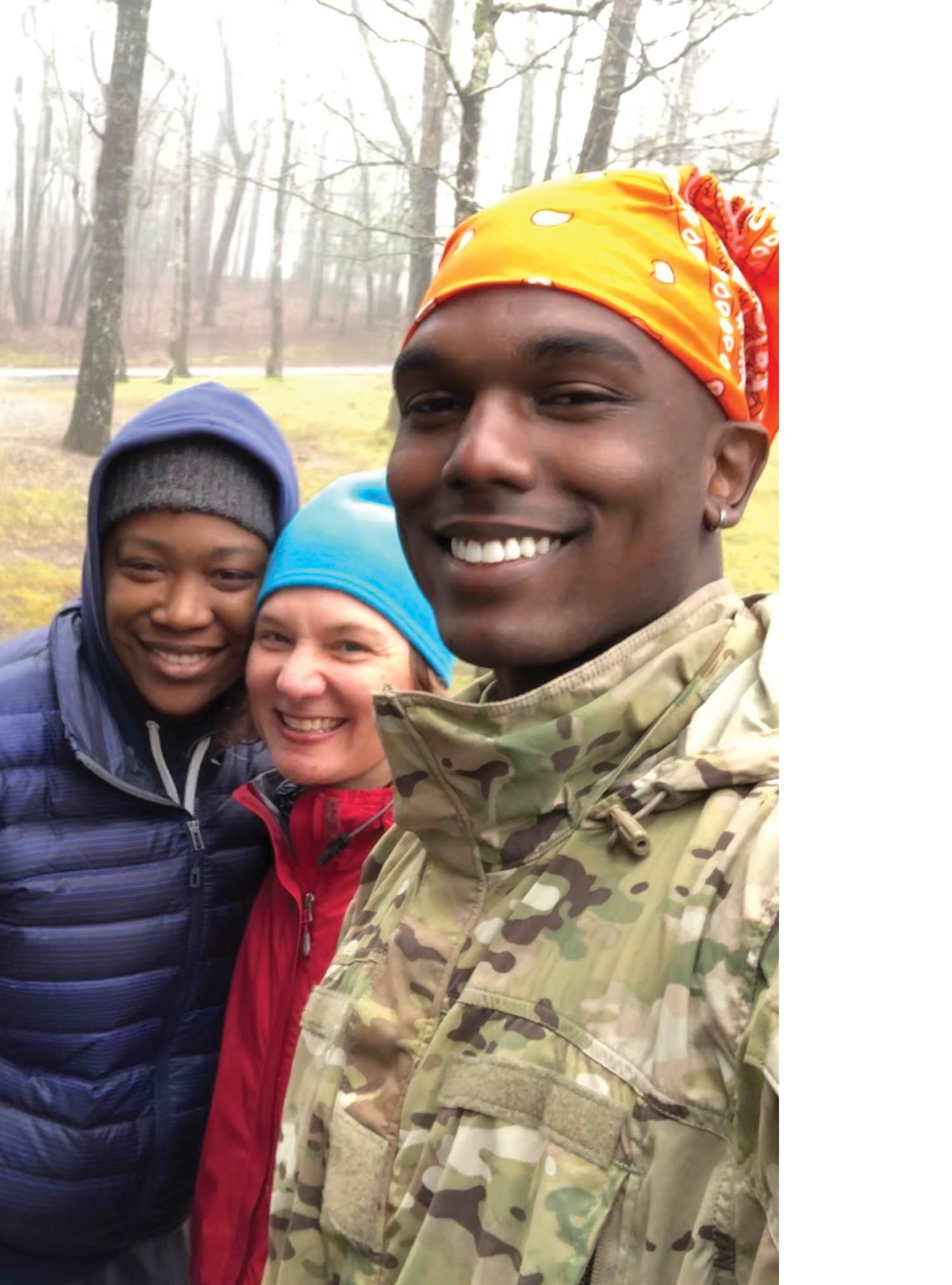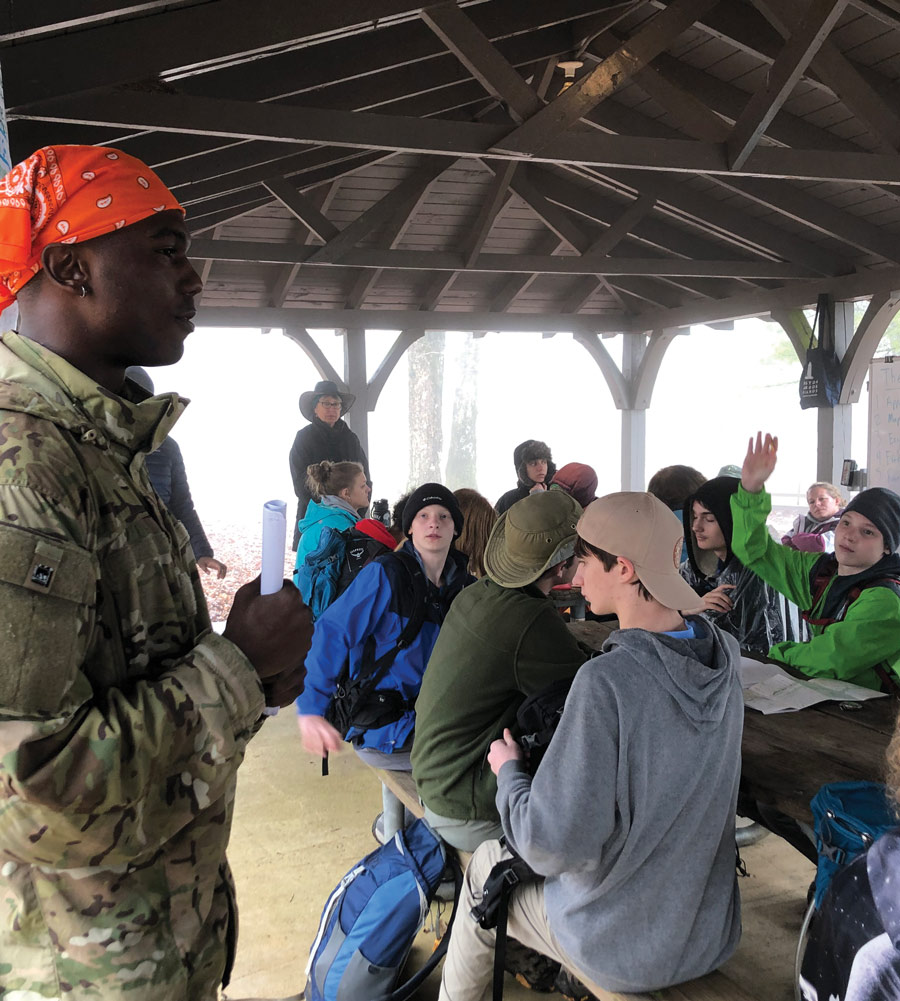

Generation
Forest
Ambassadors

By Julie Judkins and Chloë de Camara
The phrase “love you” doesn’t exist in the Cherokee language. It must be claimed with the pronoun, GeGayYouAh, or I love you, to communicate its significance and meaning. Gil Jackson, of the Eastern Band of Cherokee, taught NextGen Forest Ambassadors words in his first language of Cherokee, along with other legends connected to lands that we now call our national forests and the Appalachian Trail.
Due to COVID-19, the 2020 NextGen Summit was moved to a virtual format. Ambassadors attended four virtual sessions together that covered core themes such as outdoor access, Leave No Trace principles, and how to best serve their communities by being an ambassador. Each ambassador also attended at least two Ambassador’s Choice sessions. The menu of sessions led by area experts included Gil’s Cherokee language and legends session; Jason Ward, famous naturalist and host of his own bird show, who let participants know anyone can be a birder; Forest Hilyer, who guided participants on a virtual nature hike; ethnobotanist Marc Williams, who identified trees with ambassadors; and an Artdoors session supported ephemeral art inspired by the Organic Artist. Each ambassador was provided with a toolbox of resources, day packs, and books for success while working towards completing their stewardship project.

From left: ATC board member and director of operations with Atlanta’s Greening Youth Foundation Eboni Preston, ATC’s director of education and outreach Julie Judkins, and NextGen mentor Khidhar McKenzie at Amicalola Falls State Park during the 2019 NextGen Forest Ambassadors Summit

From left: ATC board member and director of operations with Atlanta’s Greening Youth Foundation Eboni Preston, ATC’s director of education and outreach Julie Judkins, and NextGen mentor Khidhar McKenzie at Amicalola Falls State Park during the 2019 NextGen Forest Ambassadors Summit
The experience allows for connection, albeit virtual, among mentors, alumni, partner organizations, instructors, and of course the participants. Collaboration is integral to the success of each summit. By bringing individuals and organizations together with different experiences and skills, we are leveraging ATC resources, building social networks, and bridging opportunity gaps in communities for young people.

Avery described the whole experience as “life-changing” and said it was the happiest he’s ever been. “I was expecting a bunch of weird strangers who have a weird taste in the outdoors,” he says. “[But] when I got there, I realized that these people are just like me in that they don’t go outdoors much either.” Avery discussed how he woke up every day excited about what he would learn next. After the summit concluded, he thoughtfully described how NextGen had made him realize how much more there was to life.
Due to COVID-19, Avery hasn’t been able to get out to the woods as much as he would like but has every intention of getting back to public lands as soon as he can. Even amid a global pandemic, Avery stepped up and came back to help with the 2020 virtual NextGen Forest Ambassadors to serve as an “alumni ambassador” motivating this year’s cohorts through unprecedented circumstances.



Every year, I get more and more inspired by the next generation of leaders and I know that the world is in good hands. In 2017 I was a part of an internship program through the Appalachian Trail Conservancy (ATC) called the Conservation Leadership Corps. The program did more than just reintroduce me to the beauty of the outdoors. It showed me how critical conservation and sustainability are in a constantly changing world.


Being a mentor meant being available to discuss concerns about classes, meetings, and assisting with brainstorming stewardship projects. One important aspect was how to recreate and respect the outdoors. Every year the program covers Leave No Trace principals. These principles provide a guide on how to take care of the environment as it relates to whatever outdoor activity you may be doing. This is usually taught with help from a brilliant mind (in this case me). After those principles are reviewed, all the other cool classes come into play like ArtDoors Nature Art, Tree ID, Bird Walk, Nature Walk, and Hunting for Treasures. My challenge to others is to find a connection with the outdoors and people who care about it just as much.